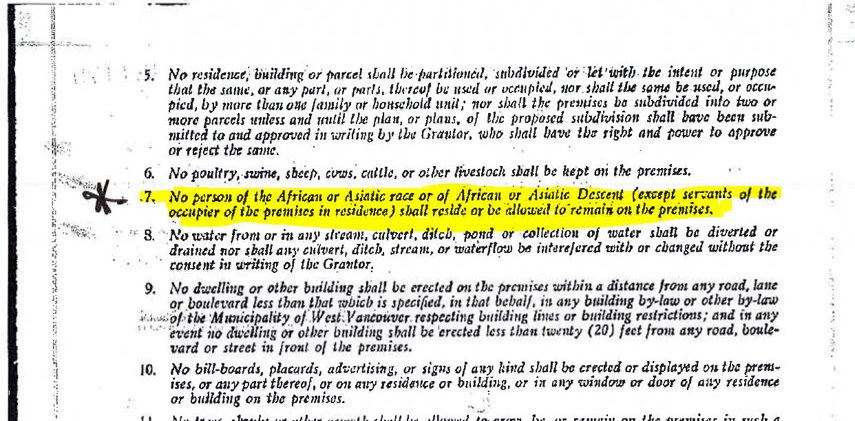On the eve of West Vancouver presenting a proposal to seek out and strike discriminatory and racist land title covenants, there may be a high-tech solution for rooting out the historical relics.
The offensive clauses that forbade people from owning properties based on their race or religion came with some developments around Canada until as late as the 1960s. They’ve been null in B.C. since 1977, but they remain on land title documents until someone makes a request to the Land Title and Survey Authority to have them struck.
The District of West Vancouver launched an initiative in 2020 “to determine the process, resources and time required to achieve the cancellation and striking of discriminating covenants.” That report is due to come before council on May 30.
No one knows how many discriminatory covenants there are in B.C. But, even when you have the address of a home with one, there is still the highly time consuming and laborious task of sifting through the arcane storage system for B.C.’s land title documents – 48,000 microfilm reels containing more than 2.2 million active land titles and roughly 100 million pages of documents.
“It's like finding a needle in a haystack. It's a very manual process and our historical data is not in a searchable database,” said Larry Blaschuk, LTSA registrar. “It's an old system that was paper-based to begin with, and the one we have in B.C. is miles ahead of what they've done in other jurisdictions around the world.”
Now, the land title authority has engaged with some Simon Fraser University scientists to use machine learning technology to help find and flag discriminatory covenants.
Using some sample pages from the registry that have been digitized, the software scans the documents and uses an artificial intelligence algorithm to help identify instances where the language may be present.
“Proof of concept is what we've done so far,” Blaschuk said. “It finds quite a few of them. It finds most of them, in fact, especially if it's typewritten.”
The plan now is to move from concept to a pilot project to validate and understand how effective the method will be on a wider scale.
Blaschuk said there has been a lot of interest in the project from the District of West Vancouver and the City of Vancouver “because that's where a lot of these things appear.”
“I have no idea what the magnitude of them left in the register is and that's something we're hoping to find out,” he said. “They occur in West Van, they occur in Vancouver, but they also occur in Richmond, they occur in Prince George. They're there all over the province.”
Finding them is one thing. It may still be very labour intensive to have the clauses struck, Blaschuk warned. And the law doesn’t allow any land title clauses to be completely deleted or made illegible.
Under the legislation, the land title office will strike through any discriminatory covenant clause at no cost to a land owner. Blaschuk said they get about five calls or emails per year making that request.



